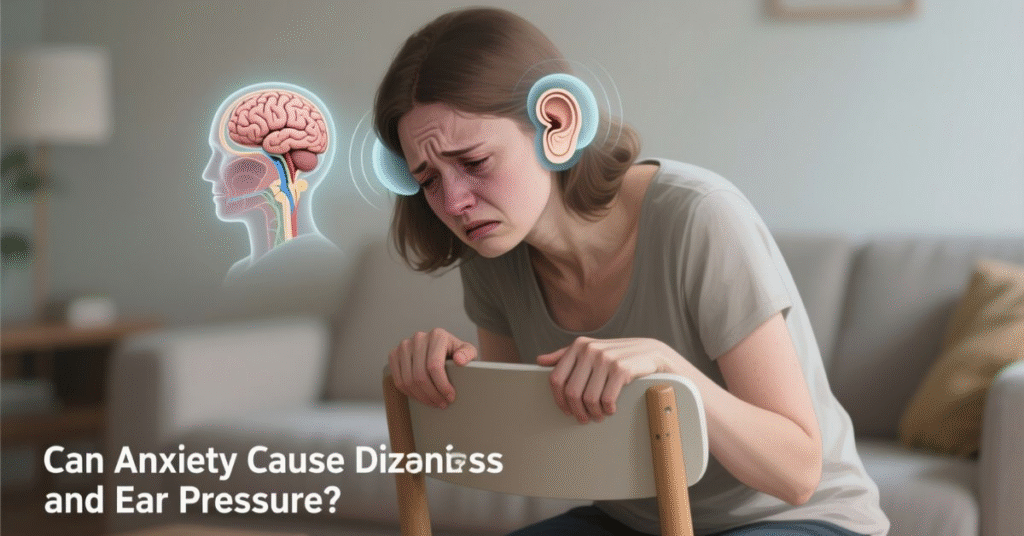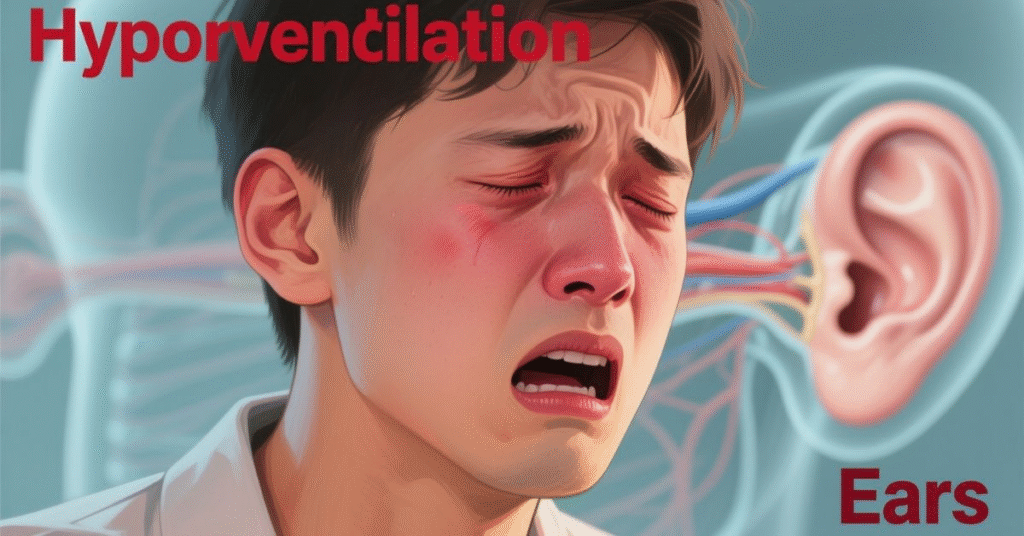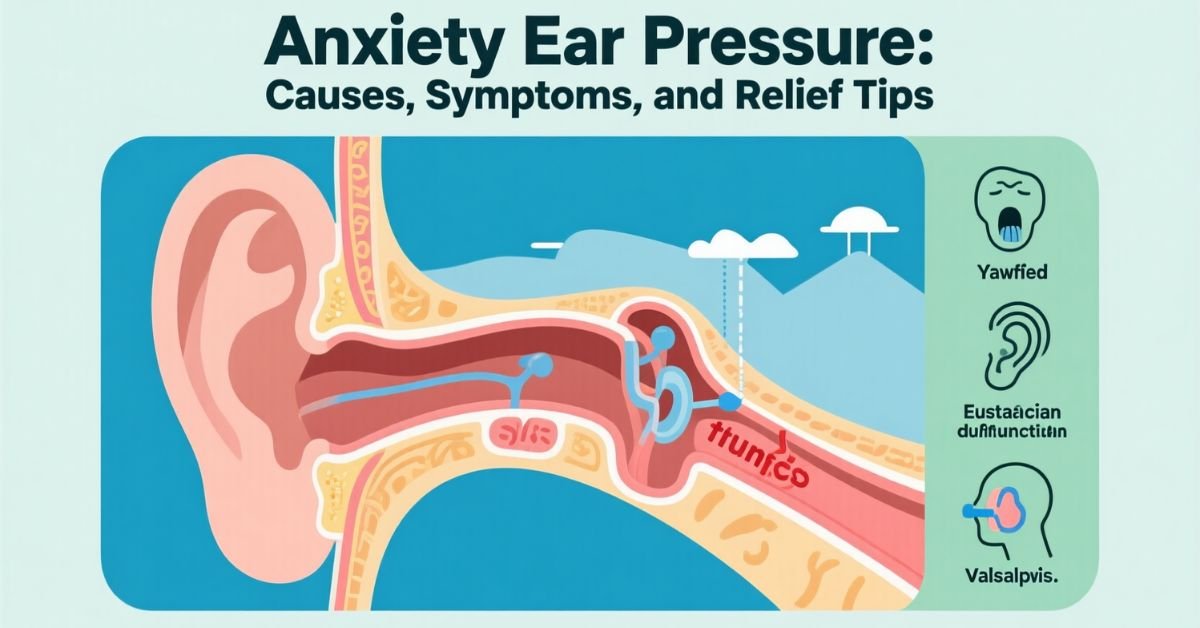Introduction
Many people notice a strange pressure in their ears when they feel anxious. This is often called anxiety ear pressure. It happens because stress and anxiety can affect the body in surprising ways, including the ears.
If you’ve ever felt your ears blocked, tight, or full during stressful moments, you’re not alone. It can feel uncomfortable and even worrying. The good news is that this pressure is usually not dangerous and can be managed with the right steps.
In this article, we’ll look at why anxiety can cause ear pressure, the common symptoms to watch for, and simple ways to find relief. Understanding the link between anxiety and your body can help you feel more in control.
Can Anxiety Cause Dizziness and Ear Pressure?

Yes, anxiety ear pressure is a common issue many people experience. When anxiety rises, the body reacts with changes in breathing, heart rate, and muscle tension. These reactions can lead to dizziness and create pressure in the ears. The sensation may feel like your ears are blocked or under strain, especially during moments of stress.
People often worry when they feel anxiety ear pressure, but it is usually not harmful. The feeling can come and go depending on stress levels and how the body responds to anxiety. Dizziness and ear fullness are the body’s way of showing it is overwhelmed. With the right relaxation methods and coping tools, anxiety ear pressure can be managed and reduced over time.
What Is Ear Pressure, and Why Does It Happen?
An ear pressure feeling is a feeling of fullness or weight inside the ear. It can make you feel like your ears are blocked. Many people notice it when flying on a plane or driving up a mountain. You experience this because the air pressure around you changes. It will take some time for your ears to adjust to these changes.
Ear pressure can also come from other reasons. A cold, allergies, or sinus problems may block your ear tubes. This makes it hard for air to move in and out of the ear. Sometimes ear infections can also cause pressure. Most of the time it goes away on its own, but if it lasts long, you may need to see a doctor.
How Does Anxiety Cause Ear Pressure?
Anxiety can change the way your body works.Your muscles tighten when you are stressed, and your breathing will become fast or shallow. These changes can affect the ears and create a heavy, blocked feeling. This is why many people notice anxiety ear pressure during stressful times.
There are a few common ways anxiety leads to ear pressure:
- Muscle tension around the jaw, neck, and face can create pressure in the ear area.
- Hyperventilation from fast breathing can upset the balance in your inner ear.
- Stress hormones raise blood pressure and increase sensitivity, which may make your ears feel full.
- Fight-or-flight response can make your whole body, including your ears, feel on edge.
Stress and Muscle Tension
Stress makes the body tense up. When this happens, the muscles around the neck, shoulders, and jaw tighten. It is possible for this tension to spread to the ear area and cause discomfort. Many people feel anxiety ear pressure because of tight muscles pulling on areas near the ears. It may feel like fullness, heaviness, or blocked ears.
Over time, constant stress can make these muscles stay tight for longer periods. This can increase pain, headaches, and even dizziness. Relaxing the body is an important step to reduce anxiety ear pressure. Simple stretches, deep breathing, and good posture can all help ease tension.
Here’s a simple table showing how muscle tension from stress can affect ear pressure:
| Muscle Area | Effect of Tension | Possible Result |
| Jaw muscles | Clenching or grinding | Ear pressure, TMJ pain |
| Neck muscles | Tightness or stiffness | Blocked ear sensation |
| Shoulder muscles | Raised or tense shoulders | Headaches, ear discomfort |
| Face muscles | Stress expressions (frowning) | Pressure around ears |
| Chest muscles | Shallow breathing | Dizziness, anxiety ear pressure |
Hyperventilation and Ears

Hyperventilation means breathing too fast or too deep. It can happen when you feel anxious, stressed, or scared. When you breathe this way, the balance of oxygen and carbon dioxide in your body changes. Having this happen to you can make you feel dizzy, lightheaded, or unbalanced.
Your ears can also be affected by hyperventilation. In some cases, people experience ringing, pressure, or fullness in their ears. Others may notice that sounds seem different. These ear changes happen because breathing too fast affects blood flow and pressure in the body. Slowing your breathing often helps the symptoms go away.
Fight-or-Flight Response
The fight-or-flight response is the body’s natural reaction to danger. It prepares you to either face the threat or run away from it. When this happens, your heart beats faster, your breathing speeds up, and your muscles get more energy. This is the body’s way of keeping you safe in stressful situations.
Sometimes the fight-or-flight response happens even when there is no real danger. Stress, fear, or anxiety can trigger it. This can make you feel tense, sweaty, or shaky. Your body is ready to act, even if nothing is actually wrong. Learning to relax can help calm this response.
Anxiety-Related Ear Pressure vs. Medical Conditions
Anxiety ear pressure can feel the same as ear problems caused by medical conditions.In both cases, you may feel fullness, popping, or discomfort in your ears. The difference is that anxiety symptoms often come and go with stress, while medical ear issues may stay or get worse over time. Knowing this difference can help you understand what is happening to your body.
Some medical conditions can also cause ear pressure. These may need treatment from a doctor.Getting checked out if ear pressure persists or is accompanied by strong pain is the best course of action. Here are a few common causes besides anxiety:
- Ear infections – pain, swelling, and pressure in the ear.
- Sinus problems – blocked sinuses can create ear fullness.
- Allergies – swelling can block the ear canals.
- TMJ disorders – jaw problems causing ear, face, and neck pain.
- Inner ear disorders – such as vertigo or Meniere’s disease.
How to Relieve Dizziness and Ear Pressure from Anxiety
Dizziness and anxiety ear pressure can be uncomfortable, but there are simple ways to find relief. Taking slow and steady breaths helps the body relax and eases hyperventilation. Gentle stretching of the neck and shoulders can also ease muscle tension around the ears. Drinking water and resting in a quiet place often make symptoms lighter.
Relaxation techniques are another helpful tool. Meditation, light exercise, or listening to calming music can reduce stress and lower anxiety ear pressure. If symptoms happen often, therapy or speaking with a healthcare professional can provide more support. Small daily habits that reduce stress can make a big difference over time.
Conclusion
Anxiety ear pressure is a common but often overlooked symptom of stress. It can feel uncomfortable and even frightening, but in most cases, it is not dangerous. Understanding how anxiety affects the body can make these feelings less scary.
With the right care, the pressure and dizziness can be managed. Simple steps like calm breathing, stretching, and stress control can bring relief. If symptoms do not improve, a doctor can help rule out medical issues. Taking care of both your mind and body is the key to easing anxiety ear pressure.
FAQs
1. Can anxiety cause ear pressure?
Yes, anxiety can tighten muscles and change breathing, which may create ear pressure.
2. Why does anxiety make me feel dizzy?
Anxiety affects breathing and blood flow, which can cause lightheadedness or dizziness.
3. How long does anxiety ear pressure last?
It may last a few minutes to hours, but usually goes away when you relax.
4. Can stress make ear ringing worse?
Yes, stress and anxiety can increase ringing or buzzing sounds in the ears.
5. How can I relieve anxiety ear pressure?
Slow breathing, relaxation, and managing stress often help reduce symptoms.

